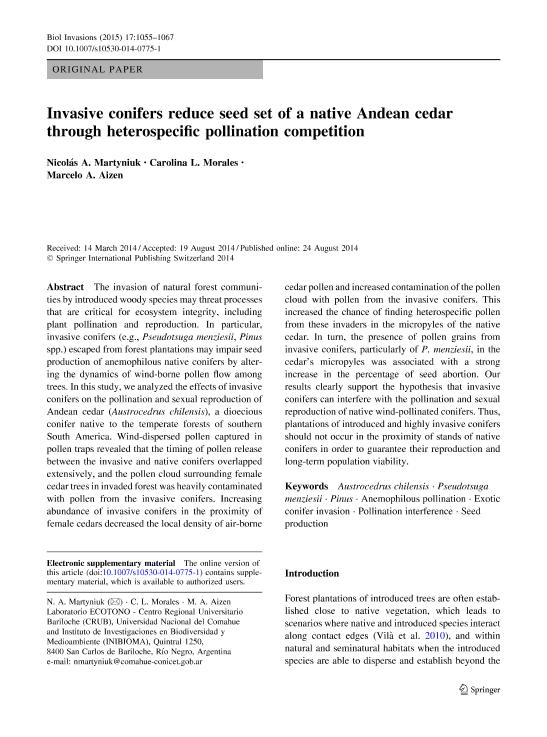Mostrar el registro sencillo del ítem
dc.contributor.author
Martyniuk, Nicolás Alejandro

dc.contributor.author
Morales, Carolina Laura

dc.contributor.author
Aizen, Marcelo Adrian

dc.date.available
2017-01-27T21:23:16Z
dc.date.issued
2015-04
dc.identifier.citation
Martyniuk, Nicolás Alejandro; Morales, Carolina Laura; Aizen, Marcelo Adrian; Invasive conifers reduce seed set of a native Andean cedar through heterospecific pollination competition; Springer; Biological Invasions; 17; 4; 4-2015; 1055-1067
dc.identifier.issn
1387-3547
dc.identifier.uri
http://hdl.handle.net/11336/12146
dc.description.abstract
The invasion of natural forest communities by introduced woody species may threat processes that are critical for ecosystem integrity, including plant pollination and reproduction. In particular, invasive conifers (e.g., Pseudotsuga menziesii, Pinus spp.) escaped from forest plantations may impair seed production of anemophilous native conifers by altering the dynamics of wind-borne pollen flow among trees. In this study, we analyzed the effects of invasive conifers on the pollination and sexual reproduction of Andean cedar (Austrocedrus chilensis), a dioecious conifer native to the temperate forests of southern South America. Wind-dispersed pollen captured in pollen traps revealed that the timing of pollen release between the invasive and native conifers overlapped extensively, and the pollen cloud surrounding female cedar trees in invaded forest was heavily contaminated with pollen from the invasive conifers. Increasing abundance of invasive conifers in the proximity of female cedars decreased the local density of air-borne cedar pollen and increased contamination of the pollen cloud with pollen from the invasive conifers. This increased the chance of finding heterospecific pollen from these invaders in the micropyles of the native cedar. In turn, the presence of pollen grains from invasive conifers, particularly of P. menziesii, in the cedar’s micropyles was associated with a strong increase in the percentage of seed abortion. Our results clearly support the hypothesis that invasive conifers can interfere with the pollination and sexual reproduction of native wind-pollinated conifers. Thus, plantations of introduced and highly invasive conifers should not occur in the proximity of stands of native conifers in order to guarantee their reproduction and long-term population viability.
dc.format
application/pdf
dc.language.iso
eng
dc.publisher
Springer

dc.rights
info:eu-repo/semantics/openAccess
dc.rights.uri
https://creativecommons.org/licenses/by-nc-sa/2.5/ar/
dc.subject
Austrocedrus Chilensis
dc.subject
Pseudotsuga Menziesii
dc.subject
Pinus
dc.subject
Anemophilous Pollination
dc.subject
Exotic Conifer Invasion
dc.subject
Pollination Interference
dc.subject
Seed Production
dc.subject.classification
Ecología

dc.subject.classification
Ciencias Biológicas

dc.subject.classification
CIENCIAS NATURALES Y EXACTAS

dc.subject.classification
Silvicultura

dc.subject.classification
Agricultura, Silvicultura y Pesca

dc.subject.classification
CIENCIAS AGRÍCOLAS

dc.title
Invasive conifers reduce seed set of a native Andean cedar through heterospecific pollination competition
dc.type
info:eu-repo/semantics/article
dc.type
info:ar-repo/semantics/artículo
dc.type
info:eu-repo/semantics/publishedVersion
dc.date.updated
2016-12-12T14:22:41Z
dc.identifier.eissn
1573-1464
dc.journal.volume
17
dc.journal.number
4
dc.journal.pagination
1055-1067
dc.journal.pais
Suiza

dc.description.fil
Fil: Martyniuk, Nicolás Alejandro. Consejo Nacional de Investigaciones Científicas y Técnicas. Centro Científico Tecnológico Patagonia Norte. Instituto de Investigación En Biodiversidad y Medioambiente; Argentina. Universidad Nacional del Comahue. Centro Regional Universitario Bariloche. Laboratorio de Ecotono; Argentina
dc.description.fil
Fil: Morales, Carolina Laura. Consejo Nacional de Investigaciones Científicas y Técnicas. Centro Científico Tecnológico Patagonia Norte. Instituto de Investigación En Biodiversidad y Medioambiente; Argentina. Universidad Nacional del Comahue. Centro Regional Universitario Bariloche. Laboratorio de Ecotono; Argentina
dc.description.fil
Fil: Aizen, Marcelo Adrian. Consejo Nacional de Investigaciones Científicas y Técnicas. Centro Científico Tecnológico Patagonia Norte. Instituto de Investigación En Biodiversidad y Medioambiente; Argentina. Universidad Nacional del Comahue. Centro Regional Universitario Bariloche. Laboratorio de Ecotono; Argentina
dc.journal.title
Biological Invasions

dc.relation.alternativeid
info:eu-repo/semantics/altIdentifier/doi/http://dx.doi.org/10.1007/s10530-014-0775-1
dc.relation.alternativeid
info:eu-repo/semantics/altIdentifier/url/http://link.springer.com/article/10.1007/s10530-014-0775-1
Archivos asociados
